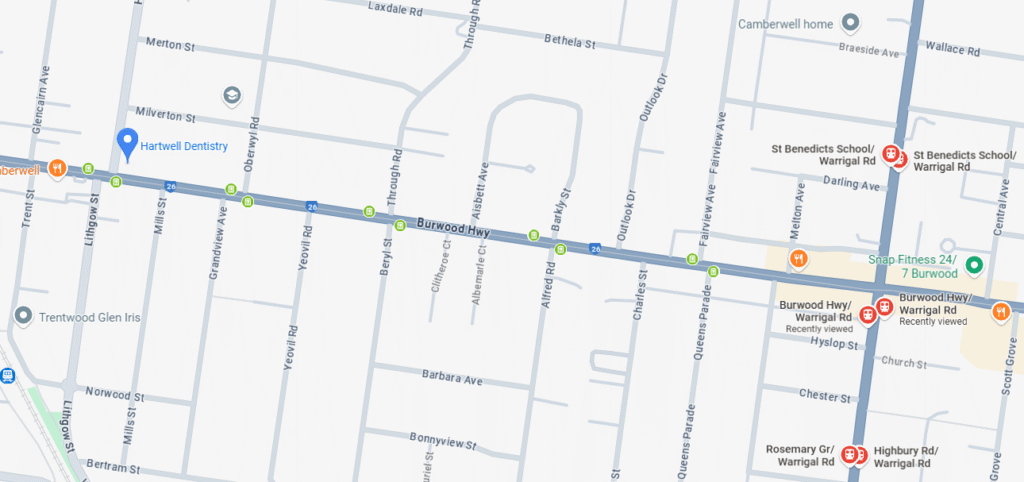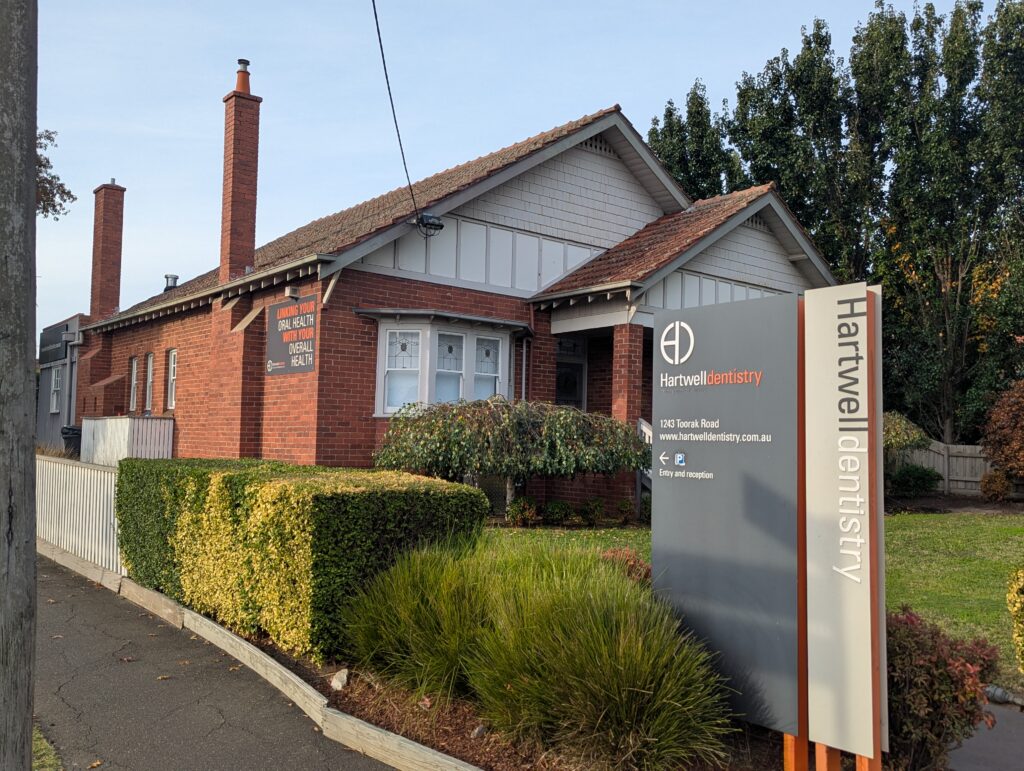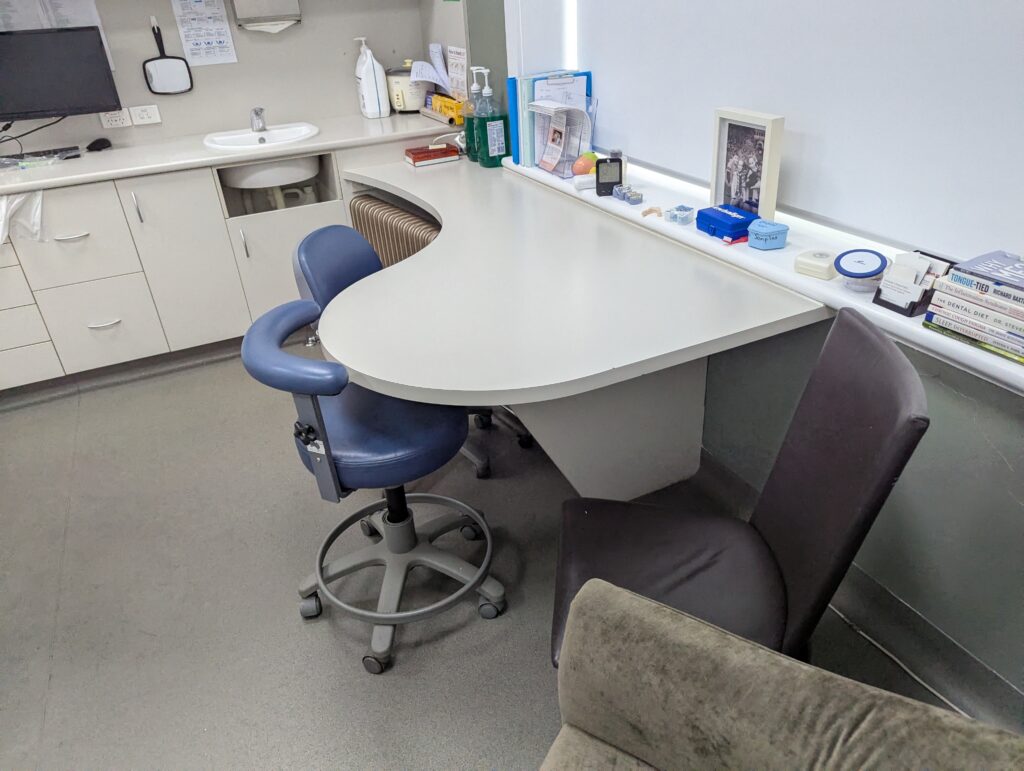Frequently Asked Questions
01.
Getting to Hartwell Dentistry
By Car
Hartwell Dentistry has on-site parking, including disabled parking spots for your comfort and access. Our car park can be accessed via Highfield road.
Public Transport - Train
The closest train station to our clinic is Burwood Station, which is a brisk 6 minutes walk away.

Public Transport - Tram
Tram Route 75 stops right outside the clinic at stop #53: Lithgow St & Toorak Rd.

Public Transport - Bus
Bus Route 903 is the closest to Hartwell Dentistry being a brisk 20 minutes walk, stopping at the intersection between Warrigal Road and Burwood Highway.


02.
We are here to help

About Our Dentistry
My Teeth Feel fine, Do I still Need to See a Dentist?
Yes, it’s important to see a dentist regularly, even if your teeth feel fine. Regular checkups can help detect underlying issues like gum disease, tooth decay, or even oral cancer before they become painful or require extensive treatment.
- Early Detection:
Dentists can identify problems like cavities and gum disease early on, when they are easier and less costly to treat.
- Oral Cancer Screening:
Regular checkups allow dentists to visually inspect your mouth and check for any signs of oral cancer.
- Preventative Care:
Professional cleaning and fluoride treatments during checkups can help prevent plaque buildup and tooth decay.
- Overall Health:
Your oral health is linked to your overall health. A dentist can identify signs of systemic diseases that may not be apparent otherwise.
- Maintaining Restorations:
Regular checkups ensure your fillings and other restorations are in good condition.
How Often Should I See a Dentist?
- General Recommendation:The Australian Dental Association (ADA) suggests a six-month interval for routine check-ups.
- Individualized Needs:Some individuals may require more frequent visits if they have a higher risk of dental problems, such as gum disease or a history of cavities.
- Factors Influencing Frequency:Your dentist will assess your individual risk factors, including your oral hygiene practices, diet, and any existing dental issues, to determine the appropriate frequency for your visits.
- Benefits of Regular Check-ups:Regular check-ups allow dentists to detect early signs of problems like cavities, gum disease, and oral cancer, preventing them from escalating into more serious and costly issues.
When Should I Start Taking My Children To a Dentist?
- Preventative Care:Early dental visits allow for early detection and prevention of dental problems like tooth decay.
- Familiarization:Introducing children to the dentist at a young age can help them become comfortable with dental visits and reduce anxiety in the future.
- Good Oral Habits:Establishing good oral hygiene habits early on can significantly impact a child’s long-term dental health.
- Early Assessment of Oral Health:A dental professional can assess a child’s oral health and identify any potential issues, such as abnormal tooth growth or jaw alignment, which may require early intervention.
- Preventative treatments:In some cases, dentists can seal small holes in teeth or provide orthodontic assessments at a young age to modify jaw growth and reduce the need for future correction.
- Prepare children for future dental visits.Early visits help them adjust to the dental environment and equipment, reducing the likelihood of dental anxiety later on.
Are You a Preferred Provider?
We have elected to remain a clinically and financially independent dental service provider.
Providing optimal patient care that is individually tailored to each patient’s needs is our top priority. At Hartwell Dentistry you will receive uncompromised service and treatment.
The services we deliver to our patients have no constraints, and cannot be influenced by any third party.
There are multiple reasons why we have chosen not to become a “preferred provider”, these include:
- We are dedicated to providing superior service and high-quality treatment to our patients, and we are not willing to compromise on the quality of our service or materials.
- We are committed to providing personalised, thorough care. We get to know our patients, and their families, individually. Our appointments are not rushed, and we take the time to ensure our patients are feeling relaxed and comfortable before, during and after treatment, and they feel completely satisfied with their treatment direction.
- We believe our services and treatment should only ever by influenced by our values and each patient’s individual needs, desires and situation. Not by a third party such as a health insurance company.
I'm Interested in Hartwell Dentistry, Where do I Start?
What Happens If I Can't Attend My Appointment?
Please call us 48 hours in advance to reschedule your appointment. Late notice or no shows will result in a no show fee being charged to your account.
Do You Offer Treatment Plans?
Through our third party partners, we do offer treatment plans for select services. Please ask our friendly reception staff for more details in a confidential setting.
03.
General Dental Questions
How Often Should I Brush My Teeth?
You should brush your teeth at least twice a day, ideally in the morning after breakfast and before bed at night. Brushing for two minutes each time helps remove plaque and food debris, promoting healthy teeth and gums. It’s also important to wait at least 30 minutes after eating and drinking, especially acidic or sugary foods, before brushing.
Do I Really Need To Floss?
Flossing at least once a day helps remove plaque and food debris from between teeth. We also recommend the use of piksters to help clear debris and maintain the space between your teeth better.
What Is the Difference Between a Dentist and A Dental Hygienist/OHT?
Both dentists and dental hygienists are qualified to perform professional teeth cleans. However, their training and focus are slightly different.
Dental hygienists complete a three-year Bachelor of Oral Health, where their main focus is on preventive care — helping you maintain healthy gums and teeth and prevent problems before they start. They are highly skilled in performing detailed cleans, removing plaque and tartar build-up, and providing tailored advice to support your at-home oral care routine.
Dentists, on the other hand, receive broader training that concentrates on diagnosing and treating dental conditions such as decay, fractures, and gum disease. While dentists can also perform a clean, their expertise lies more in diagnosis, treatment, and restorative procedures — including fillings, crowns, and extractions.
At our practice, our hygienist will perform your regular hygiene visits, while our dentist will oversee your overall oral health, carrying out comprehensive examinations and coordinating any treatment if required. This collaborative approach ensures your smile receives the best combination of preventive care and expert dental management.
Is Teeth Whitening Safe?
When used as directed, professional teeth whitening is a safe, effective way to brighten your smile with confidence.
Why Do Dentists Take X-Rays?
Dental X-rays play a vital role in understanding your overall oral health. They allow our team to see beyond what’s visible to the eye — including the roots of your teeth, the jawbone, and nearby structures such as the sinuses. With this deeper insight, we can detect potential issues early, plan treatments accurately, and ensure the long-term health of your entire mouth and supporting structures.
